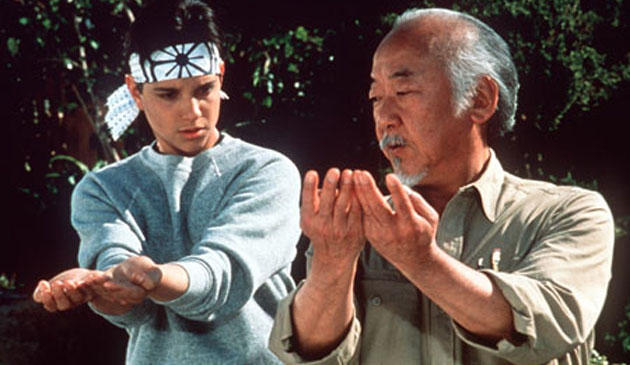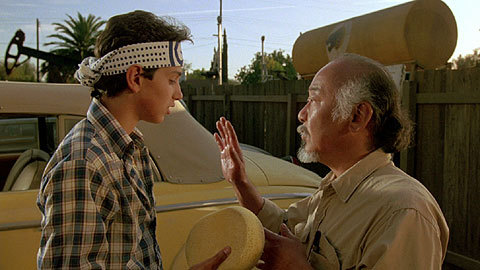
Photo Credit: Kalexanderson via Compfight cc
“Sticks and stones may break my bones, but words will never hurt me.” Do you remember teasing that phrase around the play ground? It is a cute little cliche phrase that catches on quickly. We like to teach this phrase to our kids with the hope that we can instill in them the idea of self-confidence, ignoring what other people say about them and finding positivity in themselves.
If we stop and think about it however, I think we would realize that this is one of the most deceiving and harmful things we could teach our kids. Perhaps the way this phrase should really be taught is, “Sticks and stones may break my bones, but say them enough times and words will kill me.”
As adults we know that words can sting. Not only can they sting, but they can consume and eventually kill us inside. Let’s all face reality for a minute; if you’re called names like liar, loser, pathetic, worthless, failure, ugly, miserable, stupid, or unqualified enough times – you’ll start to believe it. Not only will you start to believe it, but you will be consumed with the idea of proving everyone wrong and that you’re not any of those things.
Let’s take this a step further. If we’re honest with ourselves, every time we try to tell ourselves things like “I am what I say I am,” or “no one can change the way I feel except for me,” or “I accept myself for the mess that I am,” or whatever other crafty little saying you can find on Facebook – these are all just defense mechanisms to cover up the fact that we are hurt by what other people have already said about us. Because we are so consumed by what everyone thinks about us, we need to tip the scales by consistently telling ourselves that their words don’t matter. We have to tell ourselves this because those words do, in fact, matter.
For those of us who are in Christ however, God’s words are stronger than the words of this world.
Forgiven.
Loved.
Reconciled.
Adopted.
Child of God.
Righteous.
Clean.
Accepted.
Because God’s words about us are final through the sacrifice of Jesus, we don’t need to try and find positivity and acceptance inside ourselves. We can rest in the love of God toward us once and for all. His words about us are complete and eternal. There is no need for us to put up defense mechanisms because of what other people say; God’s word carries infinitely more weight.
Christian, rest in the words God has declared about you to be true. You don’t need to spend time defending yourself to others or trying to make yourself feel better. Jesus’ bones were broken by sticks and stones, so that his words would give you life. Take comfort in what was done on your behalf so that you would be given a new identity in Christ.
“See what kind of love the Father has given to us, that we should be called children of God; and so we are.” – 1 John 3:1
My wife and I had an unexpected visit from a saint last night.
Ever since we moved into our house, our kitchen sink has been getting more and more clogged until it finally stopped draining at all last night. For the first time – but certainly not the last – we called a plumber to our house to come help us fix this clog that was embedded somewhere deep in our pipes. Our new friend Young came to help us.
As it turns out, Young lives in the condo’s right behind our new house. This gave us a great place to start our conversation. Young is a middle aged man who served in the Korean army, but has now been a plumber for eighteen years. He is married with four young kids.
As our conversation progressed, I began to ask him about his pastor and church. Young began to tell me what it was like for him to go to just one of the many Korean churches that populate our small suburban sliver called Centreville. In this area, Korean churches are like 7-11’s in most other cities – there is one on every corner. Young told me about how that was so hard for the Korean community because there are so many churches and none of them seem to want to work together. He described how every young Korean seminary graduate wants to come and plant the new “next big thing” in the Korean community, rather than build up churches there that already exist.
He continued to tell me how this creates a culture in the Korean community where each pastor becomes a salesman for their own church. He described one scenario of a young, fresh seminary graduate who was starting a new church showing up on his doorstep and handing out his business card.
“I don’t want your business card,” said Young. “But tell me, where did you graduate from school?”
Instantly the young seminary graduate lit up and got excited to tell Young about his educational credentials. He gloated in his prestigious degree from Westminster California, and how he previously had a degree from MIT. This green pastor was very proud.
By this point, Young knew who this man was. Before him was another young, prideful wanna-be pastor who didn’t understand the Church and was perfectly fine with stealing sheep from another flock to start his own thing. “Get out of my house and never come back,” he told the pastor. While blunt and possibly lacking in grace, that certainly got the point across.
Young left my house shortly thereafter. He never knew anything about my wife and I other than that we too were Christians who attend church regularly. He didn’t know that I have plans for vocational ministry, or that I am currently in seminary.
I tell this story for two reasons.
One, it is a clear example of how in the family of God we are all on the same footing. No one is better than any other or in a higher status. More knowledge or degrees do not qualify someone for always being the teacher instead of the student. The Church of Christ turns the categories of the world on its head! Only in the Church is it common to find a janitor teaching an Overland Park injury lawyer, a school teacher instructing a doctor, or a stay-at-home mom counseling a CEO. I’m reminded of Colossians 3:16, where all believers are commanded to teach and admonish one another. It doesn’t matter what your profession is or how much money you make; you have something to give and teach to your brothers and sisters in Christ. We are called to share the comfort and knowledge God has shown us with others.
Secondly, this conversation really stuck out to me as one of those bright-eyed seminary students Young mentioned in his story. From personal experience, I’ve noticed that we seminary students tend to place a lot of weight on our seminary credentials and training. We take pleasure and pride in what we learn in all of our various classes. We think that we have something within ourselves to offer people. When this happens, we begin to place confidence in ourselves rather than in the cross of Christ. Our churches begin to look a lot more like our personalities, rather than looking a lot like Jesus.
I’ve said this before, and I need to repeat it to myself often: at the end of the day, nobody really cares how much we know, what school we graduated from, what degree we have, or what classes we’ve taken. People want to know what we can give and show them. And what do we have to give? What we possess does not come in the form of fancy theological terms, understandings of church fathers and tradition, or new emerging ideas on critical linguistic studies. It does not come in the form of “5 points in improving your marriage” or our latest thoughts and speculations on a certain text. It does not come from loud music, flashy lights or big buildings. All we have to offer people is a 33-year-old naked Jewish man hanging on a Roman cross. That’s it. If your theology and seminary education does not give people this Man then it is useless, vain speculation. Don’t waste anybody else’s time with it.
This message of a crucified, suffering Savior is utter foolishness to the world, but to those of us who are being saved we know that it is the power of God. We know that it is the only hope that we have. That dear friends, as a saint equipped to minister with the gospel (which we all are in Christ), is all we have to give to each other. Glory to the crucified King!
There is a movement today in Christian circles which is attempting to reconcile Universalist ideas and the Christian faith. The basic idea put forward is that continuing to teach that faith in Christ alone is the only way to God is too exclusive, intolerant, or troubling for our conscious. So because of these things, many progressive leaders like Brian McLaren are attempting to offer “new and fresh” perspectives that allow us to believe Universal doctrines are compatible with Christianity.
The alternative – that Christ alone is the way to God and eternal life – is often explained by these progressive leaders as some sort of unnecessary fundamentalist Bible-thumping dogma. To be sure, Bible-belt cultural Christianity has only fueled this idea in recent years. But this issue goes far deeper than just a few Bible verses that could simply be read from different views. The entire Bible falls apart – the entire Christian faith falls apart – if you remove the exclusivity of Christ.
Combining Universalism and Christianity is a terrible and grievous error to make. While I have no doubt that some kind, genuine and well-intentioned Christians believe and try to reconcile these two things, for the most part this teaching leads people astray and outside of Christian faith. Below I have listed 15 reasons (and there are surely more) for why Universalism and Christianity are not compatible and must not be combined.
1. Combining Universalism and Christianity undermines the finished work of Christ.
Scripture is clear that the sacrifice of Christ was the once and for all finished sacrifice for sin (Hebrews 7:27). When Christ hung on the cross, he did not cry out “It is finished…except for whatever else you want to do to get to God” (John 19:30). Christ and Christ alone has done what is necessary to bring us to God. King Jesus died – DIED – to bring us to God. The tortured, humiliated, and crucified kind of died. Why, why would we want to take away from that by saying that was only necessary for some people but not all people? That alone makes my stomach churn at the thought of diminishing the beauty and glory of Christ’s humiliation.
2. It undermines the eschatological (that is, final) reality of living in between Christ’s two advents.
Christ came once as the sacrifice for sins (1 Corinthians 15:3) and will come again at the consummation of all things. In between these two advents is the church age; in these last days God has spoken to us through the Son (Hebrews 1:2). This message of the Cross is the power of God unto salvation to all who believe (Romans 1:16) and it is the mission of the church to preach this message to all nations (Matthew 28:18-20). But if you believe in a Universal Christianity hybrid, then…
3. There is no need for evangelism.
If people can be saved by Christ but also through their own works, then why evangelize? What if I preached the gospel to someone who was on track to be saved by their own works outside of Christ, but once they hear the gospel they reject it? Well now I’ve just damned them (Hebrews 10:29). The Apostle Paul says that he would gladly trade his own salvation if it meant his fellow Jews would be saved (Romans 9), but there is no reason for him or us to feel that way if people outside of Christ can be saved.
4. Mixing Universalism with Christianity undermines the force, movement and emphasis of the Bible.
Christ himself taught that the entire Old Testament points to him (Luke 4:21, 24:13-35). The Apostle Paul teaches that righteousness has always come through faith in who the Triune God has revealed himself to be. Romans 4 tells us that those who lived prior to Christ were declared righteous because of their faith in the Triune God who saves, Romans 3:21-28 and Romans 5 tells us that we are now saved and declared righteous due to faith in the finished work of Christ. Everything points to and is climaxed in Christ’s life, death and resurrection.
5. It denies any means to preach assurance to lost and broken people.
When people are facing their own mortality, by what means do I have to preach assurance to them? Only in the gospel can I preach to someone, “Repent of your own sins, put faith in the finished work of Christ alone and subscribe to believing in him alone and you shall have eternal life (John 6:51).” What is the alternative? “Well, you can believe in Jesus, or you can just hope in your own thing, whatever it is, and hope that you’re good enough, that works too. It’s whatever.” There is no power to save and no assurance for the forgiveness of sins without the gospel.
6. It destroys the theological implications of the entire New Testament.
The first half of the book of Romans (which is arguably the theological climax of the entire Bible) is one giant argument for the need for the exclusivity of Christ. The Apostle lays the framework for understanding that no one is good on their own (Romans 3:11), that all have sinned and fall short of God’s standards (Romans 3:23), that all are equally in need of the righteousness that comes through faith (Romans 3:9, 24), that this faith must be in the work of Christ (Romans 5:1), that this faith is not something of ourselves but a divine gift from above (Romans 3:27, Ephesians 2:8-9), and that this faith only comes through hearing and believing the Gospel (Romans 10:14).
Further, every New Testament author at some point in their writing will speak of faith and repentance in Christ and Christ alone. From just a perspective of New Testament theology alone we see that any form of Universalism and Christianity are incompatible.
7. It insults and diminishes the sacrifices of the heroes of our faith.
Peter: crucified upside down
James: put to death
Andrew: crucified
Thomas: killed by a spears, burning plates and then finally burned alive
James Alpheus: stoned and had his brain bashed out
Philip: tortured and crucified
Matthew: martyred
Nathanael: tortured and crucified
Simon the Zealot: crucified
Judas Thaddeus: beaten to death
Matthias: stoned and crucified
Paul: beheaded
Countless early church Christians killed, crucified, burned, stoned…
Countless martyrs throughout the centuries killed for preaching the gospel.
Countless missionaries, such as the Europeans missionaries sent to evangelize the Celts and Vikings were slaughtered by the native people they were attempting to reach.
Did the Apostles and innumerable other Christians throughout the last two-thousand years die because Christianity was compatible with “doing good” or other world religions?
8. Combining Universalism and Christianity denies the power unto new life for the defeat and mortification of sin.
Jesus Christ bore our sins that we might live to righteousness (1 Peter 2:24), only in Christ do death and sin no longer have power over us (Romans 6:1-14). The gospel contains the power to set people free from slavery and bondage. Without the gospel, I instead tell people to just try harder and do what they can. Anyone who has tried to escape their own sin knows that this only leads to grief, heartache, guilt, and turmoil.
9. It makes the mistake of teaching that mankind is worth saving.
None of us deserve or are owed eternal life. We are all equally guilt and deserving of God’s wrath. The penalty for our sin is eternal death, but God in his mercy and goodness has saved those who believe in the work of Christ (Romans 6:23). To teach that Universalism is compatible with Christianity is to teach that everyone is deserving of being saved, when God’s Word tells us the exact opposite.
10. It teaches a different kind of God’s love.
The love of God is displayed to us in the death of Christ while we were still sinners (Romans 5:8). The greatest love of all is displayed in that Christ would lay down his life for us and call us friend (John 15:13). The supreme love of God is displayed in Christ’s humiliation and his obedience to death on a cross (Philippians 2:1-11). If Christ’s death and sacrifice is not necessary for salvation, then this demonstration of love is obliterated. For that matter, what kind of God would destroy his own Son if it wasn’t completely necessary?
From a Universal Christian perspective, God is a cruel tyrant. From an exclusive Christian perspective, God is an amazing, loving, and sacrificial Father.
11. It denies the severity of sin and depravity of man.
The Bible clearly teaches that all of human kind has fallen and has been tainted by sin (Romans 3:23, Isaiah 53:6, Romans 3:11-18). This does not mean that we are incapable of doing “good” things for one another, it means that all of our being is subject to sin and we are incapable of overcoming the guilt and penalty for our rebellion against God. Teaching that people can be saved apart from faith in Christ finds its starting place grounded in the goodness of man, not the sin and fall of man.
12. It denies the words of Christ himself.
Christ himself repeatedly speaks of the exclusivity of faith in him. Here are just a few examples: John 6:51, Luke 24:44, Luke 24:47, Matthew 28:18-20, John 14:6. Many progressive teachers who want to combine Universalism with Christianity consider themselves “Red Letter Christians,” that is, only the words of Christ in the Gospels are supremely authoritative but the rest of the New Testament might not be. Well, even if you just consider yourself “Red Letter,” you’re still stuck with plenty of exclusive claims by Jesus himself. There is no getting out of them.
13. Piety does not diminish the need to believe the gospel.
No amount of piety replaces the need to hear and believe the gospel. Even the supremely pious and outstanding Gentile Cornelius had to repent and believe the gospel. The whole point of God speaking to Cornelius (Acts 10) was to send for Peter, which helped Peter’s realization that the gospel was necessary for Jew and Gentile alike (Acts 11:11-18).
God’s Word is clear, we are saved by grace through faith, not by any amount of pious works so that none can boast (Ephesians 2:8-9). This is the beauty of God’s love for us!
14. Teaching Universalism as compatible with Christianity undermines the gospel.
What is the gospel? Simply put, it is the message that Jesus Christ the Eternal Son of God descended to earth, taking on the form of human flesh, to take our place and pay the sacrifice needed for our sins that we might believe and be forgiven of our sins, thus inheriting eternal life. This amazing forgiveness of sins comes completely apart from our own works. If you blend Universalism and Christianity together and say that the gospel or some other world religion can save, then do you really believe the gospel? How can you on the one hand preach a message that says salvation only comes by grace through faith alone and in Christ alone, but then say that someone could be saved by some other means? It simply does not work.
15. It denies the authority of Scripture
If you deny all of these problems by combining Universalism with Christianity, then you are left with a mangled Bible that only makes sense based on how you decide to read it. This is what pastor Tim Keller calls a “Stepford God,” a god that you yourself have created and only agrees and obeys you in your own mind.
—–
Undoubtedly the exclusivity of Christ is a hard doctrine. Our conscious’ bear witness to this fact. After all, countless people die every day without ever hearing or believing in the gospel. But this reality is not a reason to cave in and deny the very teachings that make Christianity what it is. Knowing that people die every day without Christ should cause us to cry out in agony and despair for the lost; not to give up, sit back and do nothing. This agonizing reality is one of our chief motivators for us to reach everyone we possibly can.
The late Christian scholar J. Gresham Machen once said “You simply can’t create whatever you want and call it Christianity. You’re free to believe it, just don’t call it Christianity.” This is true today of the movement which seeks to combine Universal ideas with Christianity. You’re certainly free to believe that Christ is just one way to God (although it makes zero logical or reasonable sense to do so, based on the above). But you can’t go around calling that Christianity, because that’s not what it is. It’s Universal Deism.
Church, let us not neglect this great salvation (Hebrews 2:3). Let us not deny the blood-stained savior who purchased us and ransomed us to himself. Let us be encouraged and spurred on that God would descend and humble himself to take on our flesh that we might be united to him. There is no other message that brings this hope to a lost and broken world!
Out of the great 1980’s movie era came what is widely regarded as one of the most iconic films in movie history, The Karate Kid. In this film, the protagonist Daniel-San is perpetually bullied and beat up by the Karate students of the Cobra Kai dojo until the wise sage and Karate master Mr. Miyagi steps in and saves him. Eventually, Mr. Miyagi reluctantly agrees to teach Daniel-San Karate in order to beat the Cobra Kai bullies in a local Karate tournament.
Unbeknownst to Daniel-San, Mr. Miyagi begins teaching him Karate through regular household chores; waxing Miyagi’s car, painting his house and fence, and sanding his wooden deck. Of course without the end result in mind, to Daniel-San this is nothing more than being an errand boy in a feeble attempt to earn Mr. Miyagi’s time so he’ll teach him real Karate. This only lasts for four days, until finally Daniel-San has had enough with the chores and furiously decides its time to go home.
“Daniel-San!” exclaims Mr. Miyagi. “Come here!”
As a martial artist myself, I love what follows in this scene between these two characters. Mr. Miyagi begins to unfold what his plan has been all along. “Sand the floor” is not simply a technique Daniel-San learns to make a deck look nice, but to block kicks coming at his midsection. “Paint the fence” is not only the proper technique for exterior remodeling, but for blocking high and low punches as well. “Wax on, wax off” is another way of saying, “Use correct technique or you’re going to get punched in the face.”
Daniel-San finally gets it; he’d been learning Karate all along.
Sometimes I feel like my attempts at learning theology are much like Daniel-San’s approach to learning karate. I don’t want to know application and wisdom, I just want to know facts and answers. My pride gets in the way and turns theology into an intellectual pursuit rather than worship. It is all too easy for me to turn my studies of the Scriptures into an attempt to tear down other peoples philosophies and worldviews, completely neglecting the fact that I’m supposed to be drawing closer to the holy and loving God of the entire universe. In haste, I determine that people who aren’t teaching me enough facts aren’t teaching me enough “theology.” After all, in order to be the best around you have to know more than everyone else, right?
Take for example when I started my Islam class a couple years ago. I went into the class wanting a five-point systematic discourse on how to tear apart Muslim apologists. Instead, I learned that if I don’t actually love people, I have no business engaging in evangelistic dialogue – regardless of how much I know.
Wax on, wax off. Paint the fence, Ben-San.
When I first became a Christian and the majesties of God were opened to me, I bought every apologetic resource I could find hoping to prove to my friends why I was right and they were wrong. I had no conception that a right understanding of God should only lead me to a correct worship of God.
Wax on, wax off. Paint the fence, Ben-San.
I think about how often I go into a sermon on Sunday simply looking for new nuggets of information and knowledge, rather than a desire to draw near to the throne of grace through the preaching of God’s Word. Instead of setting myself at the foot of the cross, seeking to have the Word of God pierce my heart, I elevate myself to a place where I feel worthy of picking apart good or bad facts.
Wax on, wax off. Paint the fence, Ben-San.
After every one of these examples, I had a moment where I realized that my original desires weren’t for real theology, but something entirely different. Every time my knowledge and pride puffs me up, like a crane kick to the face I get knocked down and realize I don’t know real theology at all.
The truth is, more often then not I act like one of the antagonist students from Cobra Kai than I do a protege of Mr. Miyagi. My goal is to show no mercy, sweeping the leg of my opponents and humiliating them at whatever cost. Oh Lord, shape my study of you to lead towards praise of you! It has been said that a right theology leads to proper doxology. May my life be evidenced not by how much I know, but by the magnitude of the God I worship. He must increase, but I must decrease.
Being the best around isn’t about how much you know, but instead is defined by being united to a compassionate and loving God through the sacrifice of Christ, as evidenced by your kindness and goodness towards other people. Being the best around means realizing that Christ is Lord over all, and that I am the least of these worthy to be called one of his own.




